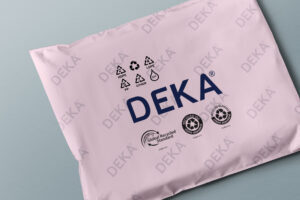Bio Bag
Bio Bag
Preferred for storing and preventing deformation of almost every product, banded and unbanded bag types offer an important storage and protection solution for products.

All Curiosities About Bio Bags
DEKA Plastik plays a pioneering role in bio bags in the packaging sector with its understanding of environmentally friendly and innovative packaging solutions. Bio bags are produced from natural materials and can be biodegradable without harming the environment. High quality standards and rules in environmental policies are applied in their production.
Bio bags are produced as an environmentally friendly alternative to plastic bags thanks to their biodegradable properties, so they break down naturally in the soil and do not harm the environment.
Bio bags can be included in the recycling process and turned into reusable materials.
DEKA Plastic bio bags provide safe transportation of products with their durable and robust structures. DEKA Plastik is constantly working to meet the different needs of its customers by offering bio bags in various sizes and designs to its customers.
DEKA Plastic bio bags are used by customers in many areas from the food sector to the retail sector, from cargo transportation to promotional products.
The materials used in the production of DEKA Plastik’s bio bags are generally vegetable raw materials and therefore suitable for renewable and sustainable waste recycling.
DEKA Plastic bio bags are among the bags that are widely used by environmentally conscious customers. Bio bags minimize the damage caused by plastic bags to the environment and make extremely positive contributions to waste management. In the preferences of DEKA Plastik customers, bio bags are highly preferred because they are environmentally friendly options.
As DEKA Plastik, we carry out careful production studies on the raw materials used in the production processes of bio bags.
Our bio bags are produced in different sizes and thicknesses in accordance with the needs of our customers. Thanks to their transparency, we ensure that our customers can easily see the contents they carry and quickly find the product they want from the bag. Bio bags offer a versatile solution that you can use in homes, workplaces or travels in terms of both its environmentally friendly structure and its variety of uses.
As DEKA Plastik, we continue our efforts to expand the use of bio bags and increase environmental awareness. If you are looking for environmentally friendly packaging solutions, you can choose DEKA Plastik’s bio bags. You can visit www.dekaplastik.com for detailed information and product options. You can meet DEKA Plastik bio bags to contribute to the environment and our future.
10 Frequently Asked Questions and Answers about Bio-Bags
Bio-bags have become popular in recent years because they are environmentally friendly. However, people still ask many questions about bio-bags. What bio-bags are, how they are made, whether they are really environmentally friendly, how they are disposed of and many more. In this article, you can find answers to the 10 most frequently asked questions about bio-bags.
Bio-bags are bags that can be used like traditional plastic bags but are designed as an environmentally friendly alternative. These bags are made entirely from biodegradable organic materials and are capable of doing the job of a plastic bag. Bio-bags are usually made from organic raw materials such as starch, cellulose, corn flour, etc. The production process can vary and some production can be more environmentally friendly, while others require more energy and water and are less sustainable. It is important that bio-bags are disposed of correctly. They can be thrown in the trash or recycling bin, just like traditional plastic bags. However, for better results, it is recommended to properly dispose of bio-bags in a home composting system or industrial composting facility.
Bio-bags are designed as environmentally friendly alternatives and can be used instead of traditional plastic bags. These bags are made entirely from organic raw materials and have a biodegradable structure. The raw materials of bio-bags are usually organic materials such as starch, cellulose, corn flour, etc. These raw materials are processed and shaped, then treated to prevent wetness and mixed with additional bacterial or fungal additives to make them biodegradable. The production of bio-bags is crucial for them to be environmentally friendly, and although they are biodegradable, they can cause environmental pollution if they are not disposed of properly or included in recycling processes.
Bio-bags are a truly environmentally friendly alternative. Compared to traditional plastic bags, they are made of biodegradable organic materials. These materials can easily dissolve when mixed with soil and do not cause pollution. However, it is important to dispose of bio-bags correctly. They can be disposed of in the trash or recycling bin, but for better results it is recommended to dispose of them correctly in a home composting system or industrial composting facility. The eco-friendliness of bio-bags can help take a step towards completely replacing plastic bags, but it is a process and more awareness and incentives are needed.
The degradation time of bio-bags can vary according to environmental conditions. They can break down at different times depending on temperature, humidity and other factors. In general, they biodegrade much faster than conventional plastic bags. Some bio-bags become completely degradable in just a few weeks. However, it is important that bio-bags are disposed of correctly because they can harm the environment if disposed of incorrectly.
Bio-bags are usually made from organic materials such as starch-based materials, cellulose, corn flour, potatoes, sugar cane, etc. These organic materials are readily biodegradable and biodegradable. The raw material selection and manufacturing methods of bio-bags are made in accordance with certain standards in order to offer an environmentally friendly and sustainable option. Therefore, the raw materials used in the production of bio-bags are safe and natural for both the environment and human health.
- Starch-based materials: One of the most common raw materials used in the production of bio-bags is starch-based materials. These materials are mostly derived from corn, wheat, potatoes, tapioca and other starchy plants.
- Cellulose Cellulose is one of the most common organic compounds found in nature. Cellulose-based raw materials are used in the production of bio-bags. This material can be obtained from the fibers of tree stumps.
- Corn flour Corn flour can also be used in the production of bio-bags. Corn flour is a by-product of the processing of starch-based raw materials.
- Potato Potato is an organic material used in the production of bio-bags, as are starch-based materials. Potato starch is used as one of the raw materials for bio-bags.
- Sugar cane Sugar cane can also be used in the production of bio-bags. This organic material is obtained from the stalks of sugar cane.
Bio-bags, which are generally made from biodegradable materials, are a more environmentally friendly option than normal bags. Bio-bags, which are produced with organic raw material selection and the right manufacturing methods, are easily degradable in nature without harming the environment and human health and are therefore becoming increasingly popular.
Bio-bags are not a product that can be used everywhere. In some countries, certification standards have been set for bio-bags due to their impact on the environment. The use of products that do not comply with these standards is prohibited. Therefore, there are a few things to consider when buying a bio-bag. It is also important that a biodegradable bag is also durable. Because bags that break down too quickly to be used multiple times can be more harmful to the environment than single-use plastic bags. Therefore, when using bio-bags, it is important to choose the right product and use the right disposal methods.
The production of bio-bags is less harmful to the environment than the production of conventional plastic bags, which are harmful to the environment. These bags are generally produced using organic materials. However, the production process varies. Some bio-bags are more environmentally friendly to produce, while others require more energy and water and may be less sustainable. For this reason, studies should be carried out to examine the production process of bio-bags so that they can be produced more environmentally friendly. With a more sustainable production method, the production of bio-bags can be increased and the use of environmentally friendly bags can be encouraged. This will ensure that we cause less damage to nature and leave a healthier world to future generations.
Bio-bags may cost more than traditional plastic bags. However, in the long run, when they are used and disposed of correctly, they can pay for themselves with great benefits for the environment. In addition, some stores offer bio-bags free of charge to their customers, encouraging them to use environmentally friendly alternatives. In some countries, governments also have tax breaks and incentive programs to encourage the use of bio-bags. The cost of bio-bags is therefore an environmentally friendly option when considered from a long-term perspective.
Although bio-bags are designed as an environmentally friendly alternative, they are not a strong candidate to completely replace plastic bags. Therefore, consumers, retailers and producers need more incentives to start using these materials more. These incentives could include financial incentives, more awareness-raising and more favorable conditions. In addition, the production of bio-bags may still be less sustainable than the production of plastic bags. Therefore, more work is needed to fully replace bio-bags.

